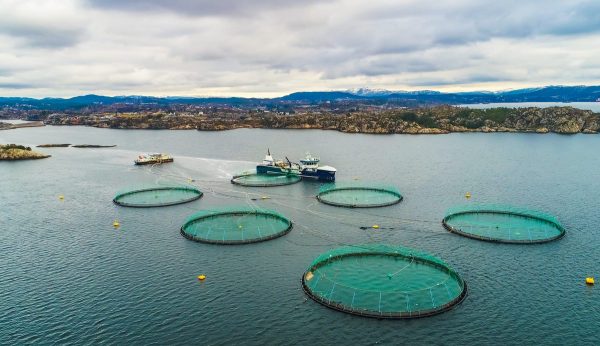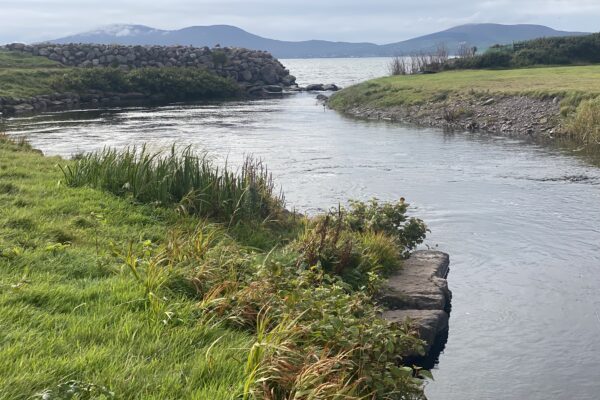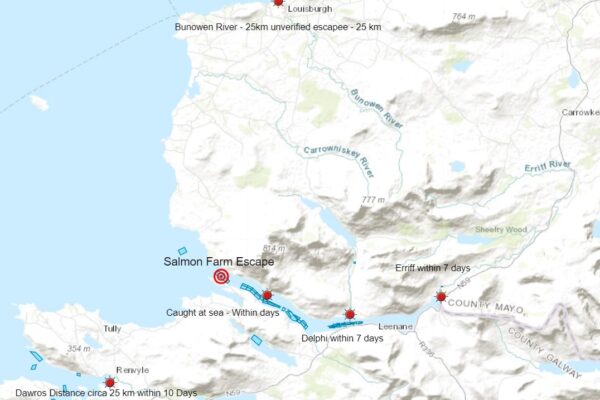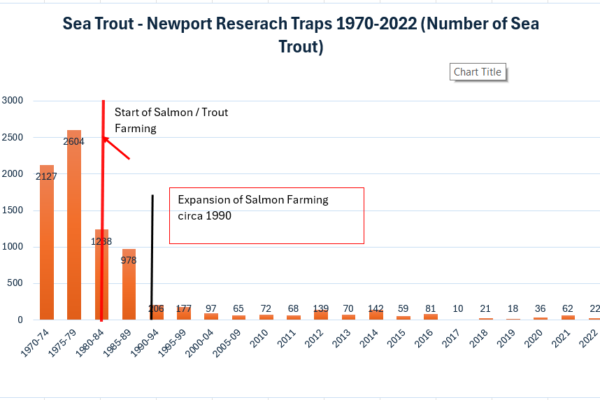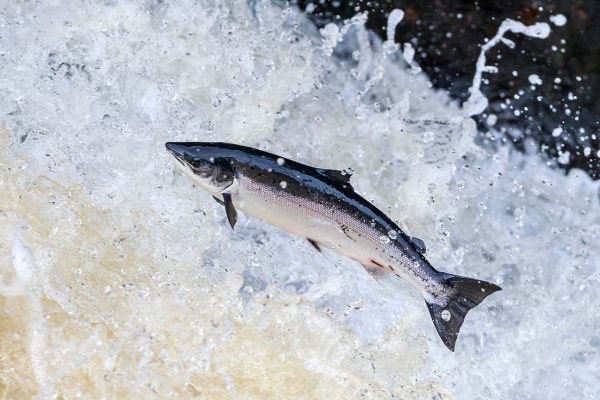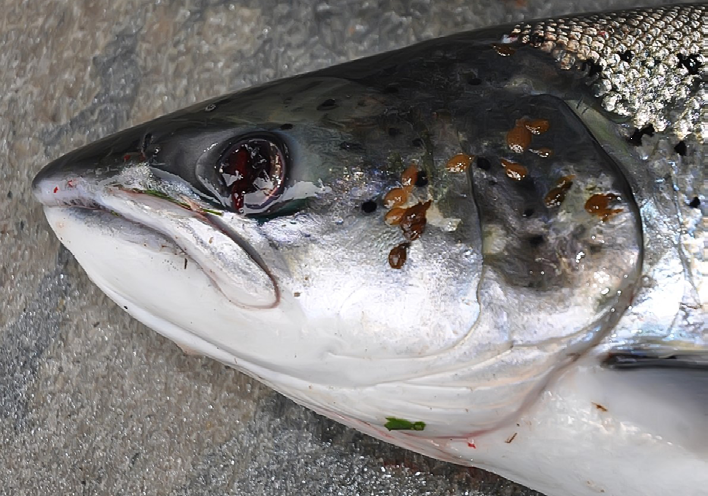-
Marine Institute - Year in Review - Declining Salmon Count and Low Levels of sea trout The Marine Institute Year in Review 2023 includes a comprehensive count of wild salmon and sea trout for 2023 and demonstrates a declining and unstable population of wild salmon and dramatic population collapse of sea trout. The data covering the period 2019 to 2023 demonstrates a declining trend of survival at sea for wild salmon and reared grilse. It is interesting to note the much improved output of salmon smolts from the relatively higher return of adults in 2020 demonstrating a strong correlation between spawning numbers and smolt output. This system is below its conservation limit due to poor adult return rates and productivity is negatively affected by environmental factors in fresh water. It is evident that more spawning fish, especially fish that are in generally good condition as witnessed in 2020 deposit more ova thus increasing productivity. This is particularly important in rivers where salmon numbers are depressed and where every salmon should be allowed to spawn. This fits in with our policy relating to exploitation and while the majority of rivers are closed to exploitation some remain open and should be treated with caution. Anglers should consider their own conduct and limit their catch. We have advocated for a reduction in tags, one salmon in spring period and return of salmon over 65cm during the summer period while advocating for catch and release of all salmon in September. We have also advocated for a cessation of commercial netting of salmon. The Data demonstrates a reducing trend in sea survival from 10.18 percent in the cohort of smolts which went to sea in 2019, through to 2022 at 5.56 percent. The decreasing trend from 2019 to 2022 smolt cohorts is as follows, 10.18, 7.17, 5.88 and 5.65 (Provisional Data 2023) percent. It is alarming but not a surprise to see the declining trend in survival at sea. 2024 did show an increase in some catchments regarding grilse numbers and it will be interesting to see data from the Marine Institute in next years report. The paltry number of sea trout returning is not surprising and this graph really demonstrates the issue. Salmon Farming is the cause of this collapse and cannot be denied.
Continue reading -
Farmed Salmon Mortality – A new low in Donegal
A new low has been reached in Donegal. Salmon farming has experienced enormous mortality events on a continuous basis but evidence is difficult to garner as the whole process of reporting is shrouded in secrecy. The majority of farm renewal applications are redacted heavily but the latest application has its mortality figures on display without redaction. Ocean Farm Ltd has applied for renewal and review of its operation in Mc Swynes Bay in Donegal and there are extraordinary mortality figures on display. To date no explanation of mortality events is to hand but the level suggests that such events are common place. It is extraordinary that such information is normally hidden from public oversight and it is very disconcerting that such events are not publicly available as the small numbers of surviving fish are entering the food chain without an explanation of the large scale mortality. We certainly are alarmed that the general public is routinely not informed of mortality events and that the commercial sensitivity of such events is being used to mask information which should be in public domain. We will be making a submission on this application in near future and will be available to use if persons wish to make their own personal observations : Extract from Application :Documentation Ocean Farm Ltd
Continue reading -
Waterville Fishery – Another year draws to a close- Sea Trout in terminal decline
Waterville's sea trout is in continuous decline and the issues with salmon farming continue. Deenish Island and Inishfarnard continue to operate and certainly are causing significant issues for the once iconic sea trout of Lough Currane. We will in conjunction with Currane fisheries soon launch a renewed campaign to highlight the damage caused by salmon farming and hope to persuade the Department of Agriculture to follow up on their decision to close Deenish in 2019. We may in time have to enter the High Court to judicially review the continued operation of the farm at Deenish and will be looking for your support in this important undertaking. We will be in touch when campaign is ready and hope for continued support.
Continue reading -
Update -Escapee Salmon on the move and fast: Farmed Salmon Caught Owenmore River
Reports coming in of farmed salmon caught on Owenmore River which is over 70 km from Killary within seven days. Is this fish from Killary or has there been another escape? Escapee salmon from Rosroe salmon farm in Killary have migrated long distances over the last ten days. These fish which have compromised genetics and may in time breed with wild salmon should at all costs be removed by any means possible. These fish have been caught both in the sea by anglers fishing for mackerel but more alarmingly have entered rivers both within Killary Harbour and further afield. Some have traveled over 25km north to the Bunowen and south as far as the Dawros system. These fish are being caught in these systems by anglers and should immediately be killed and reported to Inland Fisheries Ireland. The operator of the farm has suggested that these fish may not mature until 2025 but little is known of how they develop when released into the wild and thus may pose a risk this spawning season. There are many small rivers with unique genetic salmon populations and these are at high risk of damage by escapees through interbreeding. Disease may also pose a risk to all wild salmonids both near and far. There is every risk that the escapee salmon will continue to migrate and pose a risk to populations along the western sea board. There are a number of rivers within the area which are part of conservation areas which have wild Atlantic salmon as a qualifying interest and this highlights the unacceptable risk posed by open cage farming. There is no safe way to protect wild salmon if these farms are not moved onto land.
Continue reading -
Salmon Farm Escape – Killary Harbour , County Galway
Salmon Watch Ireland has been alerted this morning to a large escape of farmed salmon from Rosroe salmon farm in Killary Harbour which occurred on Sunday, 11th August. The escape appears to have been caused by a fish farm boat colliding with salmon cages which resulted in an escape of farmed salmon numbering over ten thousand fish. It must be stressed that this figure may be an underestimate as it is likely that accurate reporting of such escapes are at best, estimated. The farmed salmon are 1.5 kg to 2kg in weight and reports indicate that large numbers can be seen throughout Killary Harbour. The farm licence is listed as owned by Docon Limited, Mulranny Co. Mayo with a recent transfer from previous owners in October 2023. Local information suggests that MOWI have a substantial interest in this farm. Salmon Watch Ireland would like to ascertain if all operating procedures were put in place to safeguard the cages prior to this incident and if all necessary reporting steps were taken once the escape was discovered. We would also like to know if steps are to be taken to trap the escapees and prevent them from entering the nearby wild salmon catchments. In the recent decision by Judge Holland in relation to the Bantry Bay Judicial Review, he noted that the EIA was not comprehensive enough as it related to specification and structural integrity of the cage infrastructure. This incident once again highlights the dangers and risk of damage to farms and highlights the very real risk to wild salmon genetics. These fish may in time enter rivers and interbreed with the wild salmon both in Killary harbour catchments and indeed further afield. We regard the removal of open cage technologies as a priority to protect wild salmon and are calling on DAFM to reconsider siting these farms at sea. In the interim it is of the utmost importance that the maximum number of escapees are captured to reduce risks to local wild salmon populations. We encourage anglers to report and remove farmed salmon if caught and we strongly suggest that Inland Fisheries Ireland and the Marine Institute should facilitate a program of removal by all available means.
Continue reading -
Deenish Island – Six years and counting
The MOWI (Deenish Island) owned salmon farm located within nine kilometres of the once famous Waterville sea trout fishery has once again escaped judgement by the Aquaculture Appeals Board. This farm was officially ordered to close in April 2019 but has since operated unchallenged while pursuing an appeal against the closure. The sea trout fishery is effectively abandoned with a substantial loss of economic activity and the loss of many jobs associated with angling tourism. The text of the letter is as follows: "I refer to my letter of 05 September 2023 in which the Board indicated it anticipated this Appeal would be determined by 30 September 2024. The Aquaculture Licences Appeals Board (ALAB) reviewed this timescale for the determination of this Appeal at its meeting on 25 July 2024 and has formed the view it will not be in a position to determine these Appeals within that timeframe due to the ongoing collation of technical advice and the vacant position of an internal ALAB Technical Advisor. In light of this, as provided for in Section 56(3) of the Act, the Board hereby gives notice of its intention to determine this Appeal by 31 January 2025." The ongoing damage to Waterville and its angling reputation is continuing while sea trout stocks continue a rapid and accelerating decline. While Salmon Watch Ireland has successfully taken judicial review proceedings in regard to Bantry Bay we are conscious that the Deenish situation should be prioritised by all concerned with bringing back stability to sea trout stocks with economic benefits accruing to the local community. We are disappointed with the apparent apathy demonstrated by some within the local business community despite the best efforts of the local angling association (Currane Fisheries) and other conservation bodies to highlight the devastation occurring. This area more than ever needs sustainable tourism business and it is shameful that a lake like Lough Currane has effectively been consigned to the history books by the salmon farming industry. Make no mistake, salmon farming in open cage technology cannot coexist with healthy sea trout populations. It is also infuriating that the Aquaculture Licence Appeals Board has effectively allowed MOWI to delay and consistently mend their hand in relation to this appeal. Recent submissions by Salmon Watch Ireland regarding Deenish Island: Submissions to ALAB - Deenish Island
Continue reading -
Atlantic Salmon News
High Court Ruling - A good day for Atlantic salmon The long running high court case against the Aquaculture Licence Appeals Board and the Department of Agriculture, Food and the Marine received judgement on Friday 12th July, and we were successful in having the decision to issue a salmon farm licence at Shot Head in Bantry Bay quashed and sent back to ALAB and DAFM for re-decision effectively forcing MOWI to start the entire process of applying for a licence again which will be subject to our full consideration and renewed objection on numerous environmental grounds. Briefly put, the Aquaculture Licence will be quashed for inadequate: i. AA Screening of the risk of effects of seal scarers on seals of the SAC. ii. EIA as to the risks of escape of salmon from the fish farm. This finding relates to necessity of re-consideration of bespeaking the DAFM reports on the 2014 farmed salmon escape in Bantry Bay, and comprehensiveness of the EIA as it related to the specification and structural integrity of the cage installation. iii. reasons for the conclusion that the proposed fish farm will not lead to a breach of WFD limits as to Dissolved Inorganic Nitrogen – specifically, reasons for reliance on RPS’s “typical” data in reaching that conclusion. In addition, I will declare that ALAB delayed unreasonably as to AA Screening from the making of the Appeals in October 2015 to embarking on AA Screening after the Oral Hearing Report of November 2017. I will grant no further relief on that account. The Foreshore Licence will be quashed as • contingent on the quashed Aquaculture Licence, Ministerial regard to which was a statutory requirement of granting the Foreshore Licence. • the Minister erred, in breach of s.82 of the 1997 Act, in granting the Foreshore Licence in 2022, in having regard to his Aquaculture Licence decision of 2015 rather than to ALAB’s impugned Aquaculture Licence determination of 29th June 2021. The full decision is at following link. Court Judgement
Continue reading -
Marine Institute – Sea Trout Collapse
This is a graph of sea trout collapse in the Burishoole system in the west of Ireland. This is a stark reminder that sea trout and salmon farming are mutually exclusive. Salmon farms basically make sea trout survival impossible. This station is operated by the Marine Institute which is in denial of the destruction of wild salmonids by salmon farms. The recent post from Alexandra Morton showing the effect bares a striking resemblance to this. The data source is the annual report of the Newport Research which is publicly available at the following link. Marine Institute Report There is a data set of both salmon and sea trout spanning back to 1970.
Continue reading -
Lots of Licences for Salmon Farming – DAFM Active
Spate of Salmon Aquaculture Licence Applications for renewal and review. They are not out for public consultation as yet but will be in a number of days. Please find link to applications. https://www.gov.ie/en/search/?q=&sort_by=published_date&type=aquaculture_licence#search_result_label_id
Continue reading -
Genetic Impact – Escapees Norway – Is Ireland suffering same outcome
This is a very impressive portal which demonstrates the genetic introgression from farmed fish on river catchments. The resource is alarming as it shows how escapees have spawned and affected wild genetic integrity. In Ireland reports of escapes are non existent but we understand that a study is ongoing to understand the extent of introgression in Irish rivers. Norwegian Portal
Continue reading


